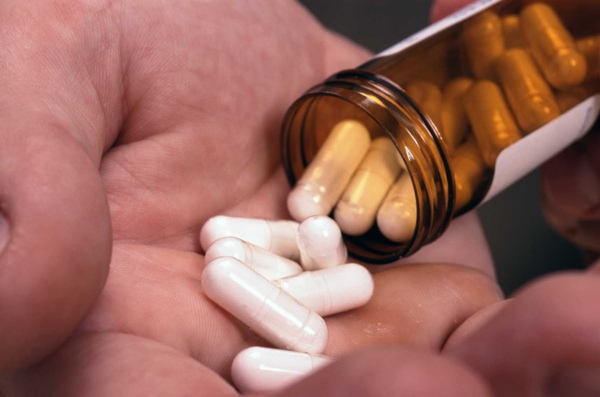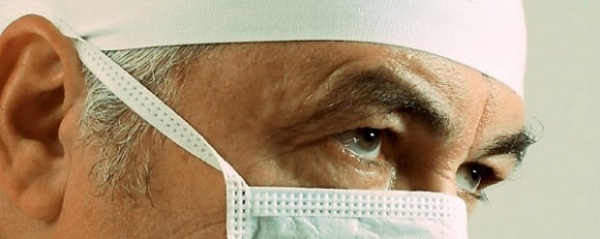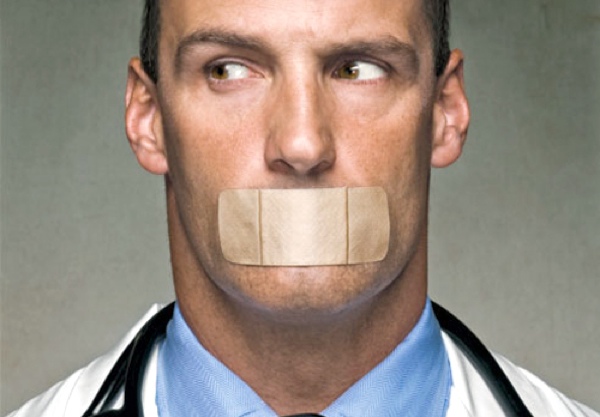 Technology
Technology  Technology
Technology  Humans
Humans 10 Everyday Human Behaviors That Are Actually Survival Instincts
 Animals
Animals 10 Animals That Humiliated and Harmed Historical Leaders
 History
History 10 Most Influential Protests in Modern History
 Creepy
Creepy 10 More Representations of Death from Myth, Legend, and Folktale
 Technology
Technology 10 Scientific Breakthroughs of 2025 That’ll Change Everything
 Our World
Our World 10 Ways Icelandic Culture Makes Other Countries Look Boring
 Misconceptions
Misconceptions 10 Common Misconceptions About the Victorian Era
 Mysteries
Mysteries 10 Strange Unexplained Mysteries of 2025
 Miscellaneous
Miscellaneous 10 of History’s Most Bell-Ringing Finishing Moves
 Technology
Technology Top 10 Everyday Tech Buzzwords That Hide a Darker Past
 Humans
Humans 10 Everyday Human Behaviors That Are Actually Survival Instincts
 Animals
Animals 10 Animals That Humiliated and Harmed Historical Leaders
Who's Behind Listverse?

Jamie Frater
Head Editor
Jamie founded Listverse due to an insatiable desire to share fascinating, obscure, and bizarre facts. He has been a guest speaker on numerous national radio and television stations and is a five time published author.
More About Us History
History 10 Most Influential Protests in Modern History
 Creepy
Creepy 10 More Representations of Death from Myth, Legend, and Folktale
 Technology
Technology 10 Scientific Breakthroughs of 2025 That’ll Change Everything
 Our World
Our World 10 Ways Icelandic Culture Makes Other Countries Look Boring
 Misconceptions
Misconceptions 10 Common Misconceptions About the Victorian Era
 Mysteries
Mysteries 10 Strange Unexplained Mysteries of 2025
 Miscellaneous
Miscellaneous 10 of History’s Most Bell-Ringing Finishing Moves
10 Ways Doctors Are Trying To Kill You
In a list of people least likely to kill you, Doctors would probably come somewhere near the top—just under Nuns but way above Chris Brown. But guess what? Not only is the entire medical profession after your blood, they’re disposing of the population at a faster rate than car crashes, Alzheimer’s or homicide. And it’s all thanks to terrifying things like:
See Also: 10 Monstrous Doctors Who Mutilated Their Patients

In most jobs, screwing up big time means losing a client, back-chatting a customer or accidentally emailing your MLP/Jersey Shore slash fiction to the entire board of directors. If you work in a hospital or pharmacy, chances are it means something a lot worse.
Take the case of pregnant Mareena Silva. After visiting her pharmacist for some antibiotics, she took one only to realize she’d just swallowed a home-abortion drug. Luckily her unborn kid survived. Others haven’t got off so lightly: Amy Francis went into a UK hospital to have a kidney removed, only to die when the surgeon set about extracting her liver. In Italy a mix up between an oxygen and anesthetic tube wound up killing eight people, while an Australian hospital tagged an elderly woman as a middle-aged man, killed her with the wrong prescription then tried to cover it up. According to the Institute of Medicine, mistakes kill around 44,000 US patients a year—a terrifying number that becomes even worse when you realize it’s the equivalent of a jumbo jet crashing every single day.

Just like politics, the medical profession comes with perks. And by perks I mean ‘bribes’. Seriously: just last year GSK were whacked with a $3bn fine for giving doctors kickbacks to promote their products. And we’re not talking a measly few bucks here and there—doctors who went along for the ride could expect to be flown to five star hotels in places like Bermuda and treated to luxury daytrips while there. Nor was this a one-off: in 2011, Johnson and Johnson was caught throwing money at Greek doctors in an evident misunderstanding of South-European economics, while drug supergiant Pfizer may have even bribed the Chinese government. Currently, at least another four major Pharma companies are facing trial for similar offences—including some of the biggest names in the business.

Most businesses have some aspect of performance-related pay. After all, targets speed up productivity, get lazy asses in gear and improve performance. What’s not to like?
Well, according to this story, government-imposed targets at one UK hospital were so damaging they were actually killing patients. By piling pressure on doctors and managers to achieve unrealistic goals, bosses were simply ensuring patient safety took a back seat—with predictable consequences. In 2008, a Royal College of Nursing survey concluded 78% of nurses felt patient care was compromised by the need to hit these impossible figures, with a further 93% saying they felt under ‘undue pressure’. If there’s one person in your life you really don’t want stressed out to the point of distraction, it’s the one who’s meant to be saving it.

When we get a virus or an infection, most of us go to our doctor, get a fistful of antibiotics and knock it on the head. Simple.
Only it really isn’t. See, antibiotics aren’t big money-spinners, meaning those bribe-factories up there aren’t interested in investing in new ones. Then you have an utterly terrifying phenomenon known as ‘antibiotic resistance’. Put simply, the super-fast process of evolution in bacteria allows strains with resistance to certain drugs to multiply until nearly all of them are immune. Then we’re in trouble: all those nasty Victorian illnesses we thought we wiped out a century or so ago might come back with a vengeance. Already, gonorrhoea and E-coli are shrugging off antibiotics like it ain’t no thang and it might be about to get a whole lot worse. Gee, thanks Darwin.

We all know the scene: the patient lies on the hospital bed, near death’s door. The doctor quietly asks if they would like to try a new ‘experimental’ drug that, though untested, just might work. The tired patient nods. After all, it couldn’t possibly make them worse.
Uh, yeah, about that – turns out there’s a big difference between ending your life in hopeless misery and hopeless agony. In a wide-ranging study, the Journal of Clinical Oncology found that less than a third of experimental drugs had a beneficial effect on the patient, while two thirds resulted in at least one severe or life-threatening side effect. You may be dying anyway, but taking these drugs is more likely to speed the process up than save your life.

We like to think of surgery as a last resort, something hospitals do only when they have to. The idea of someone knocking us out and digging around inside our body for no discernible reason is more than many of us can bear. So look away now.
One report found that 4,000 women a year are opened up to treat benign breast tumors that would never have harmed them in the first place. Given the trauma that often results from such invasive surgery, those numbers aren’t great. If you think that’s bad, wait till you hear about (ex) Dr Ian Paterson: according to this story, he stands accused of opening up and mutilating 450 women because psychosis, that’s why. Equally depressing is this recent story on a Kentucky hospital being sued by 400 patients for performing surgery with the sole intention of raking in the subsequent insurance payouts.

What could possibly be worse than needless surgery? How about neglect so bad it borders on abuse?
A recent report into deaths in UK hospitals found so many instances of death-by-neglect it would be impossible to list them all here. One 22 year old, Kane Gorry, managed to die of thirst in his bed after staff refused to give him water; a thought so awful it could only be topped by the knowledge that 110 others suffered a similar fate last year, while another 43 starved to death. Let me repeat that these are people in hospitals, in developed nations, under supposedly round the clock care. Then there’s the systematic ill-treatment of elderly patients—ranging from bullying to harassment to outright abuse—with complaints totaling over 36,000 in 2012 alone. Keep in mind these are up-to-date figures—meaning that, in 2013, thousands of scumbags still look at vulnerable people in their care, and can think of nothing but hurting them.

Even when not being actively neglectful, some doctors endanger patients through sheer laziness. Long Island North Shore University Hospital was found a few years back to have a hand washing rate of ten percent. Keep in mind we’ve known since 1847 that by washing their hands, doctors can reduce basically all of the death. Wait, it gets worse. According to a report, hundreds of doctors and nurses are neglecting to check routine things like patient blood pressure, either because they forget, or simply can’t be assed. Things have gotten so bad where basic care is concerned, that doctors in a Worcestershire hospital were forced to prescribe tap water just to make sure the nurses bothered to give patients the fluid they needed to survive. I would go on, but honestly some of these stories are just too depressing.

As we all know from hospital dramas and endless reruns of M*A*S*H, sometimes there’s just no way to save a patient. They might be brain dead, in a coma from which they’ll never recover or otherwise impossible to save—and taking up much needed beds. With a heavy heart, doctors consult the family then pull the switch, knowing they did the best they could.
Except for the times they totally didn’t. According to a very scary UK story, some hospitals are pushing patients onto a ‘path for death’ designed to help the terminally ill before they’re ready for it. In a letter to the Daily Telegraph, six doctors claimed this procedure was sometimes used to reduce strain on hospital resources, meaning there are medical professionals who put their downtime watching House above their duty to save your life. One disabled member of the UK House of Lords was even told by doctors on a hospital visit that she ‘wouldn’t want to be resuscitated’—something most of us would probably rather decide for ourselves.

After all that, it’s easy to forget that not every doctor is a cross between Jack Kevorkian and Genghis Khan. Some just happen to be genuinely decent people who want nothing more than to help patients. Too bad the rest of their profession is stopping them.
Thanks to things called gagging orders, doctors are often restrained from speaking out against colleagues or hospitals—even if the seats of said hospital are literally dripping in blood. In some states it’s even worse: according to this story, NY doctors are now asking patients to sign these orders—meaning the bozo who endangers your life can take you to court if you try to warn anyone.
But what about those doctors who speak out anyway? Yeah, most of them get their asses handed to them. Out of 26 whistleblowers surveyed in that link, 13 reported significant stress-related illnesses, while 8 lost everything. Of the 2 who managed to cling to their careers, both claimed that—were they given the chance to do it over again—they’d just take the damned bribe. Dr Stephen Bolsin was the only person to speak out against a Bristol hospital that was systematically killing children and was hounded out the country for his effort. Simply put, the system not only doesn’t reward whistleblowers, it actively destroys them, meaning fewer come forward and we remain at risk. Good luck not thinking about that next time you go for a check-up.








